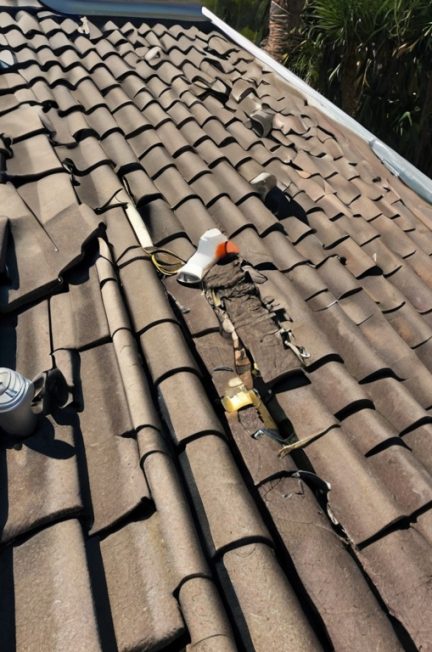Shingling a roof is a fundamental aspect of home maintenance, often requiring careful planning and execution. For homeowners in New Jersey, particularly those in areas with fluctuating weather conditions, understanding the intricacies of roofing is essential. The question “Can anyone shingle a roof?” is common, especially for DIY enthusiasts looking to save on labor costs. With CJ Commercial Roofing NJ, we will explore the roofing process, the skills required, and whether or not it’s a task anyone can undertake in New Jersey.

Understanding the Basics of Roofing in New Jersey
Before diving into the specifics of shingling a roof, it’s important to understand the basics of roofing itself. Roof shingles are a key part of any roofing system, serving as the primary barrier against the elements, including rain, snow, and harsh winds. In New Jersey, where winters can be particularly tough with snow and ice, and summers can bring high humidity and storms, the integrity of your roof is crucial for maintaining the structure of your home.
New Jersey homeowners should be aware that roof shingles come in various materials, including asphalt, wood, metal, and slate, each with its own installation process and requirements. Asphalt shingles are the most common in the state due to their cost-effectiveness, durability, and relatively simple installation process.
Can Anyone Shingle a Roof?
The short answer is: no, not anyone can shingle a roof effectively and safely. While it may seem like a straightforward task—laying shingles one by one to create a waterproof barrier—the reality is far more complex. Shingling a roof involves a series of steps that require both skill and knowledge. For instance, homeowners in New Jersey must take into account the specific climate conditions, roofing materials, and the structure of their home.
- Understanding Roof Pitch and Slope: Roofs come in various pitches or slopes, which affect the installation process. A steeper pitch, common in many New Jersey homes, presents additional challenges, making it more difficult for an untrained individual to install shingles properly. Safety is also a major concern, as working on a roof with a steep slope requires specialized equipment such as harnesses and ladders to prevent falls.
- Weather Considerations: The timing of your roofing project is another important factor. New Jersey experiences a range of weather conditions, from hot and humid summers to cold and snowy winters. Installing shingles during extremely hot or cold weather can cause shingles to become brittle or difficult to work with, making proper timing crucial.
- Shingle Installation Technique: Proper installation is key to ensuring the longevity and functionality of your roof. Shingles need to be placed in overlapping rows to create a watertight seal. Incorrect placement can lead to leaks, which are especially problematic in New Jersey, where heavy rain and snowstorms are frequent. Additionally, nails need to be driven in at specific angles and distances to avoid damaging the shingles or the underlying structure.
- Ventilation and Underlayment: A key aspect of any roofing job is ensuring that the roof is adequately ventilated. Poor ventilation can lead to the buildup of moisture in the attic, leading to mold growth and damage to both the roof structure and the ceiling of your home. In New Jersey, where humidity levels can be high in the summer, proper ventilation is essential. An underlayment, such as roofing felt or synthetic materials, must be installed beneath the shingles to prevent water infiltration and ice dam formation, which are common in the winter months.
For professional needs, you may go to CJ Commercial Roofing NJ.
The Tools and Materials Needed for Shingling a Roof
Even if you are determined to tackle the roofing project yourself, it is important to gather the proper tools and materials. Some essential tools for shingling a roof include:
- Roofing Hammer: Used for driving nails into shingles.
- Utility Knife: For cutting shingles to fit around edges and obstacles.
- Ladder: A sturdy ladder is essential for reaching the roof safely.
- Roofing Nails: These are specialized nails used to attach shingles securely.
- Shingles: The type of shingles you choose will depend on your home’s needs and aesthetic preferences.
- Roofing Underlayment: Provides an extra layer of protection against moisture.
Additionally, you’ll need personal safety equipment, such as a harness, ropes, and non-slip footwear, to prevent accidents while working at height. In New Jersey, where roofing projects are common in both residential and commercial areas, safety should always be a top priority.
Why It’s Better to Hire a Professional Roofer in New Jersey
While DIY roofing projects can be tempting due to the cost-saving potential, it’s important to weigh the risks. Here are several reasons why hiring a professional roofer in New Jersey may be the best option:
- Expertise and Experience: Professional roofers have years of experience and training. They understand the best practices for installing shingles and can do so efficiently and effectively. Additionally, they are familiar with local codes and regulations specific to New Jersey.
- Safety: Roofing can be dangerous, especially if the pitch of the roof is steep. A professional roofer has the right equipment and safety protocols to minimize the risk of falls and other injuries. They are also insured, which protects you from liability in the event of an accident.
- Quality Workmanship: A properly installed roof can last decades, while an incorrectly shingled roof might only last a few years before developing leaks or other issues. Professional roofers ensure that the job is done correctly, using the right materials and techniques.
- Warranties: Many roofing companies in New Jersey offer warranties on both materials and labor. This means that if any issues arise with the roof after installation, you can have peace of mind knowing that the roofer will handle repairs.
Local Roofing Regulations in New Jersey
Homeowners in New Jersey should also be aware of local building codes and regulations related to roofing. For example, in some municipalities, a permit may be required for roofing work, especially if the structure of the roof is being altered. Additionally, roofing companies must be licensed and insured to work in the state. Checking these regulations before starting any roofing project can save you time, money, and potential legal headaches.
Conclusion
While it is technically possible for someone to shingle a roof on their own, it is not a task that should be taken lightly. The complexity of the job, combined with the unique challenges posed by New Jersey’s climate, makes it a project better suited for professionals. Whether you’re dealing with the intense heat of the summer or the harsh snowfalls of winter, a properly installed roof is essential for protecting your home.
If you’re considering a roofing project in New Jersey, it’s crucial to hire an experienced and licensed professional to ensure the job is done safely, effectively, and in compliance with local regulations. After all, a well-maintained roof is an investment in the long-term health and safety of your home.


